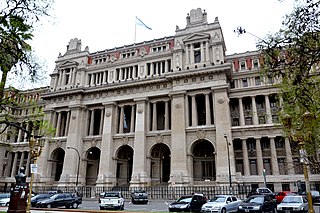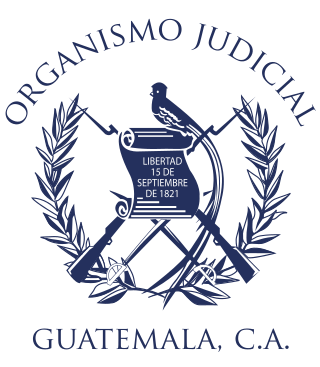
The Supreme Court of Argentina, officially known as the Supreme Court of Justice of the Argentine Nation, is the highest court of law of the Argentine Republic. It was inaugurated on 15 January 1863. However, during much of the 20th century, the Court and the Argentine judicial system in general, lacked autonomy from the executive power. The Court was reformed in 2003 by the decree 222/03.
Same-sex marriage has been legal in Chile since 10 March 2022. In June 2021, the President of Chile, Sebastián Piñera, announced that his government would sponsor a bill to legalize same-sex marriage. The Senate of Chile passed the legislation on 21 July 2021, and the Chamber of Deputies gave its approval on 23 November 2021. Disagreements on some aspects of the bill led to the formation of a mixed commission to discuss it. Both chambers of the National Congress approved an identical version of the bill on 7 December 2021. President Piñera signed the legislation into law on 9 December, and it was published in the Diario Oficial de la República de Chile on 10 December. The law took effect 90 days later, with the first same-sex marriages taking place on 10 March 2022. Chile became the sixth country in South America to allow same-sex couples to marry.

The Supreme Court of Justice of Colombia in Bogotá is the highest judicial body in civil and penal matters and issues of criminal and civil procedure in Colombia. The Supreme Court of Colombia is the highest authority in regard to the interpretation of administrative law, constitutional law, and the administration of the judiciary.
The Supreme Court of Bolivia was the Bolivia's highest court from 1825 to 2012. It was located in Sucre, 410 kilometres to the south-east of La Paz, Bolivia's capital. The Court was created by the Supreme Decree of April 27, 1825, which transformed the Royal Audience of Charcas of imperial Spain into the Supreme Court of the newly independent country. The Supreme Court of Bolivia was officially inaugurated on July 16, 1827.

Juan Nepomuceno Silva Meza, son of the writer Juan Silva Vega and professor Ana María Meza de Silva, is a Mexican jurist. He served as an Associate Justice (ministro) of the Supreme Court of Justice of the Nation since 26 January 1995, having previously served extensively elsewhere in the judiciary, including the Federal Electoral Tribunal. On 3 January 2011, he was elected Chief Justice for a term that ended on 31 December 2014.
The 2011 Chilean protests over the education have been primarily led by the CONFECH, the student unions association of Chile's 25 traditional universities, and CONES the student union association of secondary students of Chile. The student union leaders of emblematic universities and schools account for most of the movements leadership at national level.
The Supreme Court of Justice is the highest court of ordinary jurisdiction in Bolivia, based in Sucre. Its powers are set out in Articles 181–185 of the 2009 Constitution and the Law of the Judicial Organ. It was first seated on 2 January 2012.

Political Evolution, also known in Spanish by its shorthand Evópoli, is a Chilean centre-right political party, founded in 2012. The party defines itself as a liberal platform for the people who look for a "modern centre-right who proposes as the central axis of their proposal the appreciation of diversity, the emphasis on encouraging local communities and the pursuit of social justice".

The Supreme Court of Justice of Guatemala, or CSJ, is the highest court within Guatemala's judiciary branch. As the highest Court in Guatemala, it has jurisdiction over all legal matters that may arise in the country. The Court sits in the Palace of Justice, in Zone 1 of Guatemala City. The current President of the Supreme Court of Justice is Oscar Cruz Oliva, who was voted in by the Congress of the Republic of Guatemala.
Alexis Joel Zárate Maldonado is an Argentine former footballer who played as a right back.
The sexual abuse of minors by clergy of the Catholic Church in Chile and the failure of Church officials to respond and take responsibility attracted worldwide attention as a critical failure of Pope Francis and the Church as a whole to address the sexual abuse of minors by priests. Among a number of cases, that of Father Fernando Karadima, which became public in 2010, raised questions about the responsibility and complicity of several Chilean bishops, including some of the country's highest-ranking Catholic prelates.

Hugo Enrique Dolmestch Urra is a Chilean lawyer, judge, and teacher. He was a Minister of the Supreme Court of Chile, and was its President from 2016 to 2018.
Jaime Rodriguez Espoz is a Chilean lawyer who served as minister of the Supreme Court.
Carlos Enrique Cruz Lorenzen is a Chilean politician and economist who served as minister during Ricardo Lagos' government (2000−2006).

Julio César Grassi is an Argentine Roman Catholic priest and convicted sex offender, child molester and fraudster.
Doris Perla Morales Martínez is a Uruguayan lawyer who serves as a minister of the Supreme Court of Uruguay.
The following is a list of events in the year 2024 in Chile.







